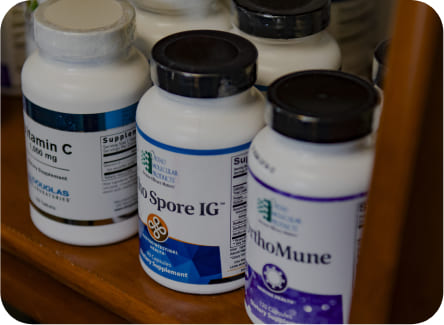
Seroquel: Interactions with Other Medications and Substances
Seroquel's Mechanism of Action and Potential Interactions
| Seroquel, an atypical antipsychotic medication, works by modulating the levels of neurotransmitters in the brain, particularly dopamine and serotonin. Its unique mechanism of action involves blocking specific receptors, which can lead to potential interactions with other medications and substances that affect the same neurotransmitter systems. |
When taken concurrently with other drugs or substances, Seroquel's effectiveness may be altered, leading to either enhanced or diminished therapeutic effects. Moreover, the combination of Seroquel with certain medications can increase the risk of adverse reactions, such as sedation, dizziness, or metabolic disturbances.
It is crucial for individuals prescribed Seroquel to be aware of these potential interactions and to discuss their complete medication regimen with their healthcare provider. By understanding the mechanism of action and the possible consequences of combining Seroquel with other substances, patients can take proactive steps to ensure the safety and efficacy of their treatment plan.
Open communication with healthcare professionals is essential in managing and preventing potentially harmful interactions. Patients should disclose all medications, supplements, and substances they are taking to their doctor or pharmacist, enabling them to make informed decisions and adjustments to minimize the risk of adverse effects while optimizing the therapeutic benefits of Seroquel.
Common Medications That Interact with Seroquel

Seroquel, an atypical antipsychotic medication, can interact with various common medications, leading to potentially harmful side effects or reduced efficacy. Antidepressants, such as selective serotonin reuptake inhibitors (SSRIs) and tricyclic antidepressants (TCAs), may increase the risk of serotonin syndrome when combined with Seroquel, causing symptoms like agitation, confusion, and rapid heartbeat.
Certain antibiotics, including erythromycin and clarithromycin, can interfere with the metabolism of Seroquel, leading to increased levels of the drug in the bloodstream and a higher risk of side effects. Additionally, some antifungal medications, such as ketoconazole and itraconazole, can also affect Seroquel's metabolism, necessitating dose adjustments or alternative treatments.
Other medications that may interact with Seroquel include blood pressure medications, anticonvulsants, and drugs used to treat Parkinson's disease. It is crucial for individuals taking Seroquel to inform their healthcare provider about all medications they are currently using to minimize the risk of harmful interactions and ensure optimal treatment outcomes.
Substances to Avoid While Taking Seroquel
Seroquel, an atypical antipsychotic medication, can interact with various substances, leading to potentially harmful effects. Alcohol is one of the most significant substances to avoid while taking Seroquel, as it can exacerbate the drug's sedative properties, causing excessive drowsiness, impaired judgment, and respiratory depression. Additionally, alcohol may worsen the side effects of Seroquel, such as dizziness and confusion.
Recreational drugs, including marijuana, cocaine, and opioids, should also be strictly avoided when taking Seroquel. These substances can interfere with the medication's effectiveness and cause unpredictable and dangerous interactions. For instance, combining Seroquel with marijuana may result in increased anxiety, paranoia, and cognitive impairment, while mixing it with stimulants like cocaine can lead to cardiovascular complications and psychotic episodes.
Furthermore, certain herbal supplements and over-the-counter medications can interact with Seroquel. St. John's Wort, a popular herbal remedy for depression, can reduce the effectiveness of Seroquel by increasing its metabolism and elimination from the body. Similarly, antihistamines, such as diphenhydramine (Benadryl), can enhance the sedative effects of Seroquel, causing excessive sleepiness and impaired mental function. To ensure the safe and effective use of Seroquel, it is crucial to discuss all substances, including prescription medications, supplements, and recreational drugs, with a healthcare professional before starting treatment.
Risks and Consequences of Seroquel Interactions

The consequences of Seroquel interactions can be severe, ranging from reduced effectiveness of the medication to life-threatening side effects. When Seroquel interacts with certain substances or medications, it may lead to an increased risk of sedation, confusion, and impaired cognitive function. In some cases, these interactions can cause dangerous changes in heart rhythm, blood pressure, or respiratory function.
Moreover, interactions between Seroquel and other substances can exacerbate pre-existing medical conditions or lead to the development of new health problems. For example, combining Seroquel with alcohol or other central nervous system depressants can result in excessive drowsiness, impaired judgment, and an increased risk of accidents or injuries.
The risks associated with Seroquel interactions underscore the importance of open communication with healthcare providers and strict adherence to prescribed dosages and guidelines. By understanding the potential consequences of these interactions, patients can take proactive steps to minimize their risk and ensure the safe and effective use of Seroquel in managing their mental health conditions.
Strategies for Managing and Preventing Interactions
| To effectively manage and prevent interactions with Seroquel, open communication with your healthcare provider is crucial. Inform them about all medications, supplements, and substances you consume to assess potential risks and adjust treatment plans accordingly. |
Regularly reviewing your medication list and discussing any changes or new additions with your doctor or pharmacist can help identify and mitigate possible interactions. They can recommend alternative medications or adjust dosages to minimize risks while ensuring optimal treatment outcomes.
Adhering to prescribed dosages and avoiding alcohol, illicit drugs, and excessive caffeine consumption can further reduce the likelihood of adverse interactions. If you experience unusual symptoms or side effects while taking Seroquel, promptly report them to your healthcare team for proper evaluation and management.
By proactively collaborating with healthcare professionals, carefully monitoring your medication regimen, and making informed lifestyle choices, you can significantly decrease the risk of harmful interactions and optimize the therapeutic benefits of Seroquel.
Importance of Consulting a Healthcare Professional
Consulting a healthcare professional is crucial when taking Seroquel, as they can help you navigate potential interactions and ensure the safe and effective use of the medication. Your doctor or pharmacist can assess your medical history, current medications, and lifestyle factors to determine the most appropriate course of treatment and minimize the risk of harmful interactions.
By maintaining open communication with your healthcare provider and disclosing all medications and substances you use, they can make informed decisions about your care and adjust your treatment plan as needed. Regular check-ins and monitoring can help identify any potential issues early on and allow for timely interventions to prevent serious consequences.




